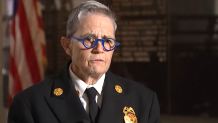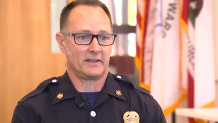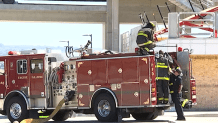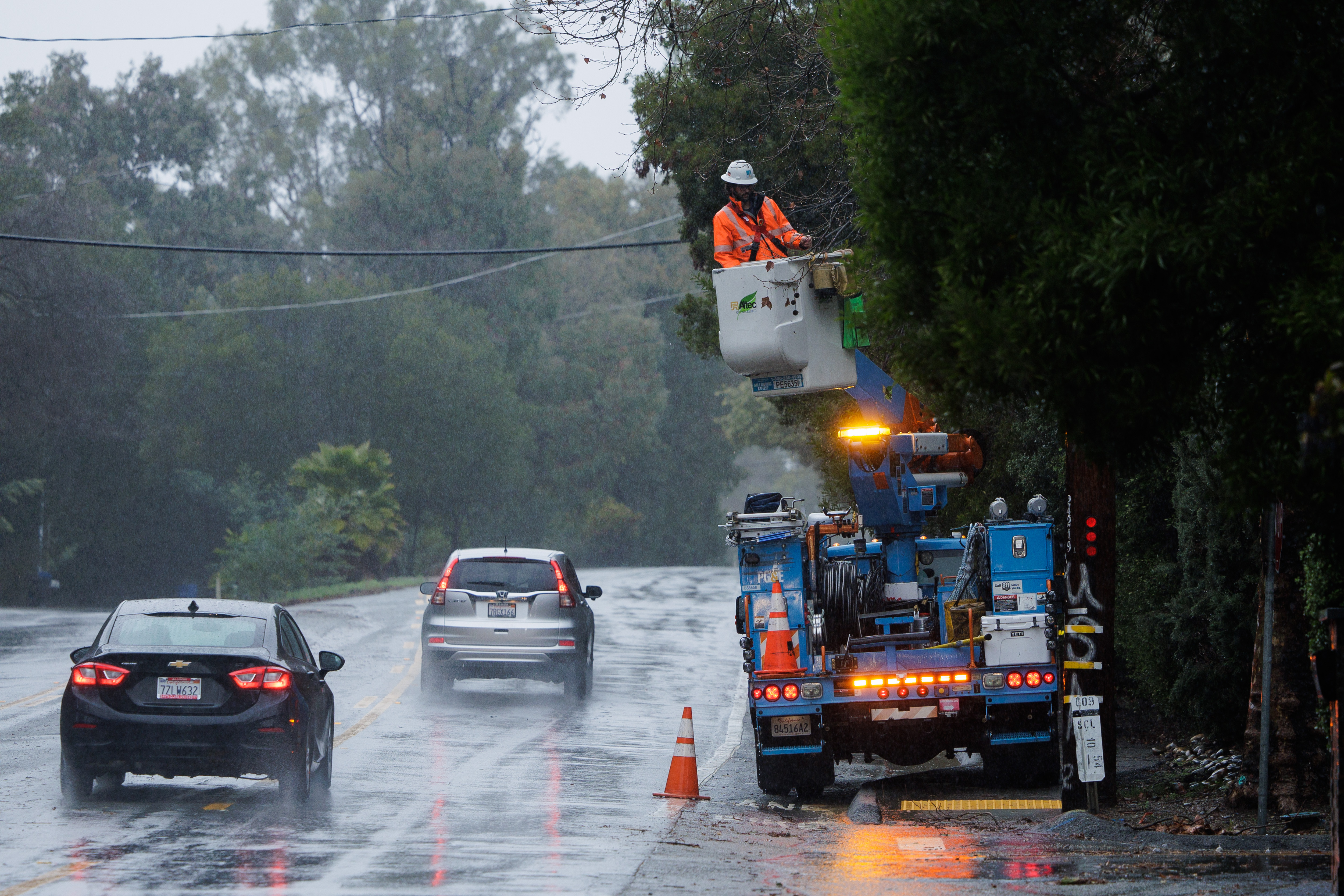Editor's note: A reference to sexual harassment and gender discrimination complaints filed against the Fairfield Fire Department has been removed from this article as the City of Fairfield mistakenly provided data for the entire city, rather than the Fairfield Fire Department
Until a federal judge in 1987 mandated the San Francisco Fire Department must better reflect the community it served, there wasn’t a single woman in the ranks of the city’s fire service.
Now, nearly four decades later, women make up about 15% of San Francisco firefighters, which places them among the top professional fire departments in the world, according to former chief Jeanine Nicholson.
“Because we have the amount of women that we do have in our department, we are seen as a light by some women,” said Nicholson, who retired from the department earlier this year.
The chief before her was a woman, and so was the chief who came after.

Most agree it’s not realistic, at least right now, to expect that women make up half the firefighters in the country. But advocates say the current numbers are far too low, even for a job that’s historically been dominated by men.
“There’s bias that exists in this world and there’s always going to be people who doubt us,” Nicholson said. “We have to meet the same physical standards, the same mechanical standards. We have to meet the same standards that the men do.”
While San Francisco may lead the nation, most of the fire service is lagging behind. Just 5% of professional firefighters in the country are women, according to the National Fire Protection Association, and the numbers are even lower in some Bay Area departments.
Get a weekly recap of the latest San Francisco Bay Area housing news. >Sign up for NBC Bay Area’s Housing Deconstructed newsletter.
The Hayward Fire Department, for example, has just one woman among more than 100 firefighters who work for the agency.
“We’re all working hard to try and recruit women and diversity, right?” said interim Hayward Fire Chief Eric Vollmer. “We all want that and need it, but it’s just the candidate pool is smaller and we’re all competing with each other for them to come work with us.”

Departments by the numbers
NBC Bay Area sent surveys to 20 fire departments across the region, asking about the number of women in each department. The survey also asked questions about gender-based discrimination or harassment complaints, and whether female employees have separate dorms and bathrooms for women.
Comparing departments against each other isn’t always an exact science, because each agency has its own job classifications and entry-level requirements for firefighters, but the data is still useful to paint a broad picture.
The average percentage of women among the 17 agencies that responded was about 7%, 2 percentage points higher than the national average.
Five other departments beyond Hayward came in below the national average, including the San Jose Fire Department, Alameda County Fire Department, Fairfield Fire Department, Contra Costa County Fire Protection District, and San Mateo Consolidated Fire Department.
Some of these agencies laid out their strategies for recruiting more women, including boot camps for women interested in the fire service, hiring full-time outreach coordinators, or fire camp programs for girls and teens.
On the other end of the spectrum, just one department beyond San Francisco was in double digits: the small Mountain View Fire Department, where 8 female firefighters make up about 12% of the department.
A handful of other agencies came close to hitting 10%, including the Palo Alto Fire Department, Berkeley Fire Department, Fremont Fire Department, and Sunnyvale Department of Public Safety, where officers are cross trained as police officers, firefighters and EMTs.
Complete survey results (as of date department responded to 2024 survey)
- San Francisco Fire Department - 15.2%
- Mountain View Fire Department - 12.1%
- Palo Alto Fire Department - 9.8%
- Berkeley Fire Department - 9.5%
- Sunnyvale Department of Public Safety (Join police, fire and EMT services) - 9.1%
- Fremont Fire Department - 8.9%
- Santa Clara County Fire Department - 7.6%
- Daly City (Part of North County Fire) - 7.3%
- Santa Rosa Fire Department - 6.9%
- Novato Fire Protection District - 6.6%
- Oakland Fire Department - 6.1% (Does not include 3 firefighters who identify as nonbinary)
- Fairfield Fire Department - 4.5%
- San Jose Fire Department - 3.7%
- Alameda County Fire Department - 3.4%
- Contra Costa Fire Protection District - 2.7%
- San Mateo Consolidated Fire Department - 2.3%
- Hayward Fire Department - 0.8%
Other factors at play
Beyond recruitment efforts, advocates say there are other factors that may be impacting the numbers, including whether agencies have separate facilities for their female employees.
NBC Bay Area’s survey found that most, but not all, Bay Area fire stations have separate bathrooms for women. Fewer departments have separate dorms for women across every fire station, although the majority still do.
Firehouse culture, too, makes an impact on whether women feel welcome, advocates said.
In San Jose, the advocacy group Equity on Fire recently blasted the department for its low number of women and accused the department of having a “toxic” culture. They point to the Pink Poodle incident, where an on-duty fire crew gave a ride to an exotic dancer, as well as an active lawsuit by a former firefighter alleging she was sexually assaulted by one colleague and harassed by others.
“That type of thing happens when there’s a lack of oversight, when there’s a lack of leadership,” said Lauren Andrade, an Orange County fire captain and the president of Equity on Fire. “And it really starts at the top.”
San Jose Fire Chief Robert Sapien said he couldn’t comment on the pending lawsuit, but denied the department has any culture issues. San Jose Mayor Matt Mahan, however, called the situation in the department “unacceptable” and just met with Equity on Fire to discuss the group’s concerns.
But such issues aren’t isolated to San Jose, Andrade said. Her group has documented cases in firehouses across the country where women have been harassed or discriminated against at work, and she said some fire departments are plagued by a “frat house” culture that can make women feel isolated.
Reaching young girls and young women
While finding qualified female recruits has been an uphill battle for most departments, some say new strategies are working, which revolve around getting girls and teens interested in the fire service at a younger age.
In Berkeley, Chief David Sprague said the department has come to learn that traditional recruitment efforts have “a minimal impact on the makeup of a candidate pool” and that it needs to reach potential recruits at a younger age.
The department now partners with the Berkeley Unified School District and a local community college district to run a vocational pathway program that begins teaching fire science courses and EMT classes to young people, with the goal of propelling them into a career in the fire service.
In Hayward, Chief Vollmer said the department is trying new strategies in hopes of getting more young people, including girls, interested in firefighting. The department has invited students from a local first responders occupational program to train at their new state-of-the-art facility.
“So that means we’re reaching a really good, diverse population of people who live here, and we’re asking them and encouraging them to come and serve,” Vollmer said.

Vollmer said the department is also removing some of the barriers to entry that might turn candidates away. You no longer need a paramedics license to test for the department, a requirement which Vollmer said has historically limited the pool of potential applicants because of the cost of obtaining one. Now, it’s a skill firefighters can learn on the job.
And there’s hope that the women joining fire departments today will serve as role models for a future generation of women, when dreams of becoming a firefighter might be more common.
“Doing this story will hopefully get our story out and maybe inspire some young ladies out there right now who maybe never thought about [a fire career],” Vollmer said.
Nicholson, for her part, believes it’s not just women who should be watching.
“I have heard from a multitude of young people how exciting it is to see a woman running the department,” Nicholson said. “And frankly, young men need to see us as well, so they’re not surprised. ‘Yeah, you’re darn right I’m a woman, and I’m your boss.”



